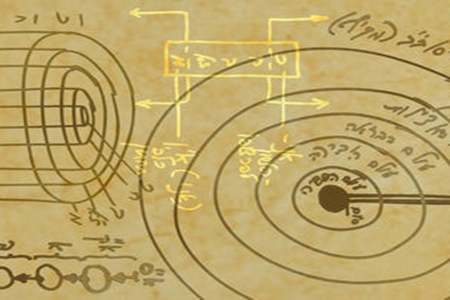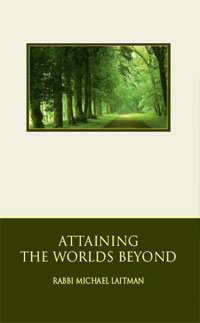
Operating “For the Sake of Bestowal”
Within each of us are seventy fundamental desires. These are called “the seventy nations of the world.” Therefore, our souls correspond to the Partzuf of Zeir Anpin in the world of Atzilut, which includes 70 Sefirot. After we begin to seek more closeness with the Creator, and receive the Light of the Kabbalah, we are given feelings and desires that we never imagined existed.
The seventy desires derive from two sources, since we move forward in combinations of the two lines—the right and the left. Our actions in accordance with the right line are countered by our evil (egoistic) inclinations (the husk, klipa) against the work of the heart, which is called Klipat Yishmael.
The work in the left line is countered by an evil force against the work of the intellect, called the Klipat Eisav. However, when we progress further in our work, we see that in order to enter into the spiritual realm we must rid ourselves of both klipot, because they do not want to receive the laws of the spiritual realm—just as it is mentioned in the Bible that the Creator offered the Torah, the laws of the spiritual realm, to Eisav and Yishmael before he gave it to Israel, but they did not want to receive it. Only after we see that we are not able to receive the altruistic-spiritual laws with either the right or left force, do we carefully progress to the middle line, which is called “We will do, and then we will hear,” which is called “for the sake of bestowal,” and is then called Israel.
Examining the Inner States You Experience
Since all of us, along with our thoughts, intentions and desires, are entirely immersed in our egoism, we are unable to think independently, objectively and non-egoistically. Thus, we are unable to criticize ourselves.
In general, we have no need to criticize ourselves, since we already know that everything we do is based on our egoistic desires. However, in working on ourselves, doing work which goes against our desires, when we invest efforts to develop spiritual yearnings, we need to examine our situation. We ourselves must examine the situation, not the Creator, Who already knows what our situation is.
The surest way to test our true spiritual state is to see whether we feel joy when we work for the sake of the Creator. If so, we see that the test is not to determine if we exert great physical or emotional strength, but rather to examine our inner state. Do we retain the same joy regardless of whether we receive from the Creator what we imagine is necessary for us, or not?
All of Reality Is in You
Kabbalah speaks of an individual as being like a whole world, since inside each of us is to be found everything around us: the universe, the nations, gentiles, the righteous people of the nations of the world, Israel, the temple and even the Creator Himself—the point that is in our hearts.
In the first place, Kabbalah teaches of our inner qualities, and then proceeds to the outer aspects that are considered consequences of the inner qualities, and thus are designated with respective names. In addition, the spiritual state of the inner qualities directly affects the spiritual state of the outer aspects and the influence of the latter upon us.
Justifying the Creator’s Actions towards You
As human beings, our initial spiritual state is egoism. One who begins to strive for closeness with the Creator is known as “a righteous person of the peoples of the world.” How can one verify if one is, in fact, already at this level? Since Man possesses only egoistic desires, everything that is missing from the gratification of the ego is perceived to have been taken away, as if what was desired had been possessed, and then stolen from the individual.
We have this feeling because of our spiritual “past”: on previous spiritual levels, our souls were completely filled with good, but with our spiritual descent into this world, all of it was lost. Therefore, the moment we feel a desire for something, it is equivalent to being filled with complaints towards the Creator about what was taken away, or was never given—that for which one longs.
Thus, if we are able to say from our hearts that everything the Creator did is for the good of all of us, and feel joy and love towards our Creator, as if we had, indeed, received from Him everything we could possibly imagine for ourselves, and justify everything the Creator supervises, then we have successfully completed the test of our intentions (Kavana).One who has succeeded in this way is known as a “righteous person of the peoples of the world.”
If, with the help of the Creator, we work further on correcting our desire to receive, then the object of verification is no longer our thoughts, but our actions. The Creator gives us everything that we ever desired, but we must be prepared to return everything, while at the same time receiving only the part that we are capable of receiving for the sake of the Creator.
 “What Justifying the Creator really Means” is based on the book, Attaining the Worlds Beyond by Dr. Michael Laitman.
“What Justifying the Creator really Means” is based on the book, Attaining the Worlds Beyond by Dr. Michael Laitman.





 “What Justifying the Creator really Means” is based on the book, Attaining the Worlds Beyond by Dr. Michael Laitman.
“What Justifying the Creator really Means” is based on the book, Attaining the Worlds Beyond by Dr. Michael Laitman.